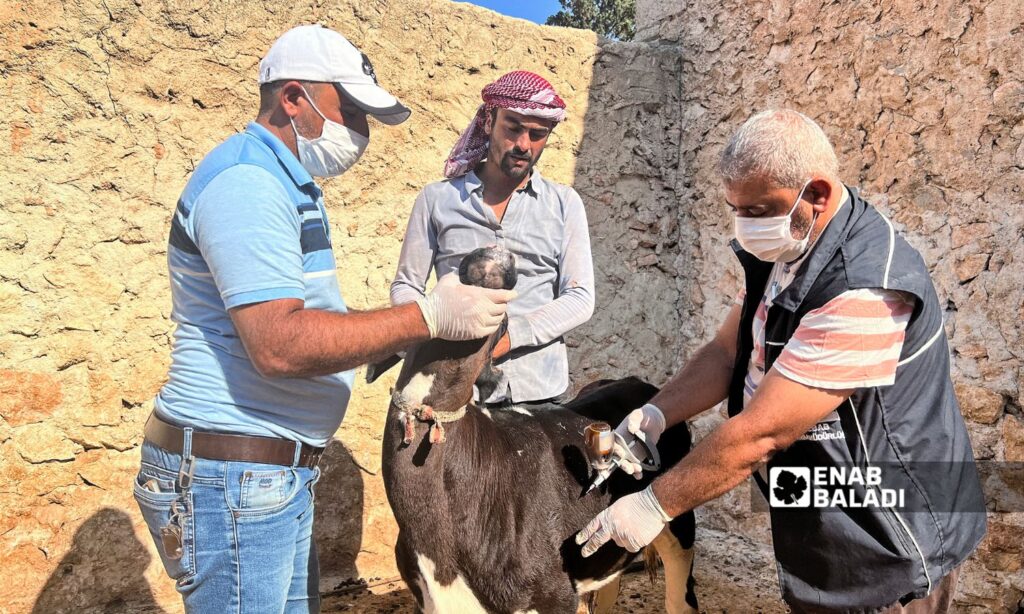Al-Bab – Walid al-Idlibi
The livestock sector in the city of al-Bab, eastern Aleppo countryside, faces the risk of foot-and-mouth disease, a highly contagious viral disease that primarily affects animals such as sheep, cows, and goats.
The disease is periodic, but it worries livestock breeders and raises their concerns amid attempts to find solutions from both the breeders and local authorities in the city and its countryside.
The number of sheep and goats in al-Bab and its countryside exceeds 150,000 heads, while there are 3,000 cows, according to figures obtained by Enab Baladi from the Animal Resources Department of the Agricultural Directorate in the region.
What is foot-and-mouth disease?
Veterinarian Majd Ismail in al-Bab told Enab Baladi that foot-and-mouth disease is an acute viral disease and highly contagious, and it is one of the old diseases prevalent in Syria. It primarily affects animals such as sheep, cows, and goats, and can sometimes infect humans in certain ways, but no cases of human infection have been recorded or heard of in the region, according to the doctor.
He explained that this disease has many symptoms, including decreased milk production, elevated temperature, loss of appetite, inflammation of the hooves, and oral lesions, noting the distinctive signs of the disease, such as the presence of blisters in the mouth and gums that extend to the rumen. It can sometimes lead to abortion in pregnant animals, and the infection spreads through milk.
The doctor mentioned that foot-and-mouth disease cannot be treated definitively, but vaccination prevents infection by 90%, and its treatment is mainly aimed at alleviating these symptoms.
He added that this disease occurs during certain months (April, September, October, and December), pointing out that it is prevalent in several countries worldwide and has several forms, including acute, subacute, and severe, which is considered one of the strongest infections that can cause 70% to 80% mortality in livestock.
Breeder concerns
Sheep breeder Sami al-Nassani in al-Bab told Enab Baladi that he suffered significant losses in his sheep during April 2023, when 200 heads of young sheep and 50 heads of goats perished in the Qadiran area near al-Bab, with one of the reasons being foot-and-mouth disease.
He stated that the mortality resulted from a severe infection that started with foot-and-mouth disease and then developed into hoof inflammation. This disease is highly contagious, and he noted that he did not benefit from the intervention of veterinarians or medications at that time.
The livestock sector representative in the Qadiran plain, Abu Muhammad, told Enab Baladi that the mortality of sheep for breeder Sami al-Nassani is a serious bacterial disease caused by foot-and-mouth disease and hoof inflammation.
Another sheep breeder, Mustafa al-Ghazali, in al-Bab shared his fears about the spread of foot-and-mouth disease at the beginning of winter and spring, indicating that he is proactive in vaccinating his livestock. He noted that his sheep had not contracted the disease for two to three years, with only limited and mild cases that did not develop further.
Al-Ghazali added that he follows temporary solutions to reduce the incidence of the disease by using sprays, antipyretics, oil injections, and anti-inflammatory drugs. For the infected cases that worry him, he resorts to old therapeutic methods, which involve a mixture for wound dressing for two to three days to alleviate inflammation.
Repeated vaccination campaigns
The Agricultural and Animal Resources Directorate in al-Bab is active in periodically announcing vaccination campaigns, whether for dogs against rabies or for livestock against foot-and-mouth disease. The latest of these campaigns was at the beginning of the current October.
The head of the Animal Resources Department in al-Bab, Mughir al-Rashid, told Enab Baladi that the directorate recently conducted a comprehensive vaccination campaign against foot-and-mouth disease in al-Bab and its countryside to maintain livestock health and enhance production, attributing it to the beginning of the disease’s spread.
He added that the disease had diminished last year, except for some individual cases that entered through smuggling from areas not targeted for vaccination.
He mentioned that the directorate informs the livestock sector representative in each town or village a day before the campaign, and in turn, the representative informs the breeders to prepare their herds for vaccination.
When the veterinary team enters the village, sheep are vaccinated according to the representative’s order in terms of quantity and location, and the team does not leave the village until the last head of livestock is vaccinated, according to al-Rashid.
According to al-Rashid’s statement to Enab Baladi, there are no statistics on livestock mortality over the past two years due to a lack of reported cases of infection by the breeders. He noted that infections have started to decline noticeably because of the repeated vaccination campaigns.
A large segment of the population in the city of al-Bab and the Aleppo countryside generally relies on livestock breeding, either to secure household supplies and dairy products or for commercial purposes.
Sheep are considered one of the most important livestock resources in Syria, and their breeding has faced setbacks during the years of the revolution due to the displacement of owners and the lack of necessary feeding and medicinal supplies for livestock, in addition to rampant smuggling operations.

